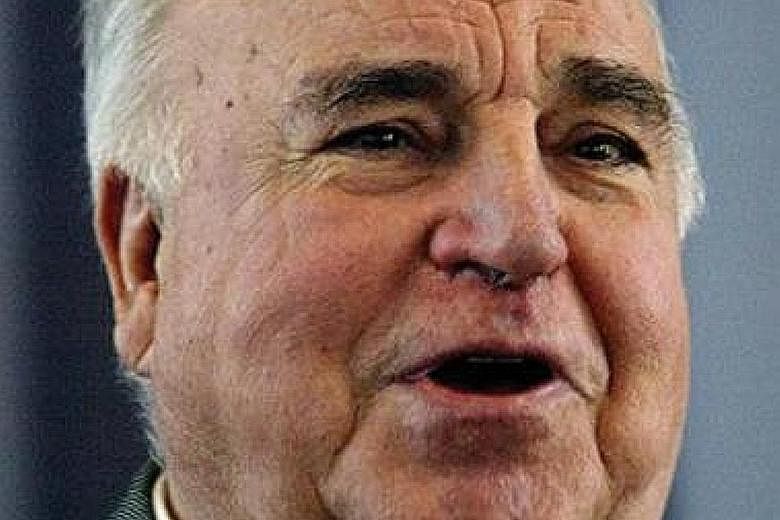BERLIN • Former German chancellor Helmut Kohl, the architect of German reunification, died yesterday, the mass-selling newspaper Bild reported. He was 87.
Bild reported in its online edition that Mr Kohl died in the morning in his home in Ludwigshafen, in western Germany.
"We mourn," Mr Kohl's Christian Democratic Union (CDU) party tweeted with a picture of the former chancellor.
Germany's longest serving post-war chancellor from 1982 to 1998, Mr Kohl was a driving force behind the introduction of the euro currency, convincing sceptical Germans to give up their cherished deutschemark.
He was born into a conservative Catholic family, and the BBC reported that his political outlook was shaped by his experiences during World War II.
Because of its huge chemical works, his home town of Ludwigshafen in the Rhineland was heavily bombed and, at the age of 12, the young Helmut found himself helping to recover the charred bodies of his neighbours from the rubble. He has said that "the blessing of a late birth" freed him from any taints of Nazism.
After studying politics and law at Heidelberg University, Mr Kohl entered politics. He rose to become the youngest Land minister-president of the Rhineland Palatinate at the age of 39. Three years later, he became the chairman of the CDU, the dominant post-war West German political party.
But after losing an election in 1976 and then sitting out the next one in 1980 in favour of another CDU candidate, it was not until 1982 after a party left the ruling coalition that Mr Kohl became German Chancellor, a role he would play for the next 16 years.
An imposing figure who formed a close relationship with French President Francois Mitterrand in pushing for closer European integration, Mr Kohl had been frail and wheelchair-bound since suffering a bad fall in 2008.
At home, he is celebrated above all as the father of German reunification, which he achieved after the 1989 fall of the Berlin Wall despite resistance from partners such as British Prime Minister Margaret Thatcher and Soviet leader Mikhail Gorbachev.
He won voters in communist East Germany by promising them "flourishing landscapes".
Shortly after leaving office, Mr Kohl's reputation was tarnished by a financing scandal in the CDU, now led by Chancellor Angela Merkel.
Mr Kohl mentored Dr Merkel early in her career, appointing her to her first ministerial post.
Until his death, Mr Kohl refused to identify the donors in the financial scandal, saying he had given them his word. He was spared possible corruption charges out of respect of his years of leadership. Nevertheless, his reputation was badly damaged, reported the BBC.
His wife Hannelore committed suicide in July 2001.

